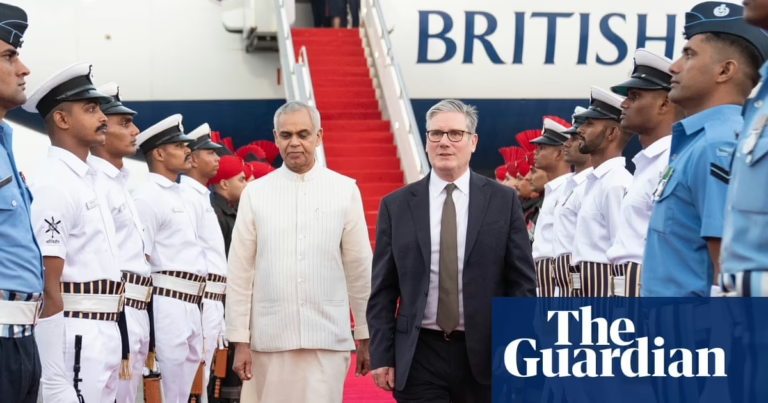During his visit to Mumbai, Keir Starmer plans to explore India’s digital identification framework as a potential blueprint for the UK, lauding it as a “remarkable achievement.”
On his two-day trip, Starmer engaged with specialists familiar with India’s digital ID infrastructure, advocating for a similar voluntary system in the UK that could eventually extend to applications for schools, mortgages, and driving licenses.
Starmer held discussions with Nandan Nilekani, the non-executive chairman of Infosys, focusing on the rapid deployment of India’s system and its impact on streamlining welfare services-reducing administrative hurdles while also sparking debate over the exclusion of certain minority groups.
India’s Aadhaar program, rolled out over the last decade and a half, now covers nearly all of its 1.4 billion residents.
A spokesperson for Starmer clarified that the talks were not aimed at forging any commercial partnership with Infosys, emphasizing the UK government’s intention to develop its own public-sector digital ID platform.
Nonetheless, Starmer’s interest signals the government’s ambition to integrate such an ID system into the UK’s welfare framework eventually.
Addressing the press en route to Mumbai, Starmer expressed hope that digital IDs-whose popularity has waned since his initial announcement-would regain public trust due to the convenience they offer.
“I’m sure many of you have experienced the frustration of rummaging through drawers for multiple documents when enrolling your children in school or applying for various services,” he remarked.
“We stand to gain considerable benefits. India has already implemented a successful digital ID system, so one of my key meetings will focus on learning from their experience.”
India’s digital ID system is far more comprehensive than the UK’s proposed model, incorporating biometric identifiers alongside residential and contact details. Officials have stated there is no intention to replicate the Indian system wholesale but rather to study its implementation and daily handling of approximately 80 million transactions.
While widely regarded as a success, the program has sparked controversy, with estimates suggesting it has saved India’s economy around £11 billion by reducing administrative inefficiencies and corruption.
Each citizen receives a unique 12-digit number, eliminating the need for multiple paper documents when opening bank accounts or accessing government benefits. Before Aadhaar, many newborns went unregistered, complicating access to essential services later in life.
Critics argue that the system was launched without adequate safeguards for personal data, leading to hardships for vulnerable populations, including denial of healthcare or benefits due to lack of ID.
In some cases, telecom providers and banks have threatened to close accounts not linked to Aadhaar numbers, although India’s Supreme Court has ruled that private services and educational institutions cannot mandate it. Activists have also raised concerns about its use in disenfranchising Muslim voters in northern regions.
Starmer’s team emphasized that the meeting was intended to gain insights from India’s experience, noting the system’s distinct origins and structure but highlighting its extensive daily usage.
When questioned about the controversies surrounding India’s system, Starmer clarified that the UK’s approach would differ significantly, with no current plans to incorporate biometric data. “Ensuring inclusivity is a fundamental priority, and that will be central to the British public consultation,” he stated.
Starmer also highlighted the scheme’s role in combating illegal employment, making ID mandatory for work purposes, while envisioning it as an optional convenience for the wider population.
The prime minister further suggested that the success of the UK’s migrant return agreement with France depends on robust measures against unlawful employment. Right-wing factions have spotlighted gig economy platforms like UberEats and Deliveroo, where migrant workers have reportedly used fraudulent identities.
“We need effective return agreements, such as the one with France, and must address the issue of illegal work in this country,” Starmer explained. “That’s why mandatory ID for employment is crucial.”
He added, “There’s a strong argument for extending voluntary digital ID use into other sectors, and it’s an important conversation to have. So, while it will be compulsory for work, I believe it could serve as a valuable credential for many.”
To date, no private companies have been selected to participate in the scheme. Notably, tech firm Palantir declined involvement, citing the absence of the plan in Labour’s manifesto and thus a lack of mandate.
Opposition parties uniformly oppose the initiative, and some Labour MPs remain wary of escalating costs and potential data security risks.
Public support for digital ID cards has dropped sharply, from 35% earlier in the summer to -14% following Starmer’s announcement, according to polling by More in Common.
During his visit, Starmer is scheduled to meet Indian Prime Minister Narendra Modi and deliver a keynote speech at a fintech conference. Addressing a delegation of over 120 business and cultural leaders, he expressed optimism that each would secure agreements by the trip’s conclusion.
At a Bollywood studio, Starmer announced that Yash Raj Films will produce three major films in the UK starting next year, generating upwards of 3,000 jobs.
Downing Street stated that deals inked during the visit are expected to create approximately 7,000 jobs through Indian investments in the UK. Speaking at a football stadium, Starmer dismissed claims that business leaders had pressed for visa relaxations.
“Visa issues have not been raised with me by any business leaders. That was not part of the free trade agreement,” he said. “This visit is about enabling businesses to capitalize on the FTA, and even before it’s fully implemented, the relationship between India and the UK is very strong.”






















